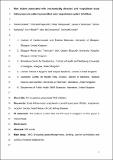Risk factors associated with biochemically detected and hospitalised acute kidney injury in patients prescribed renin angiotensin system inhibitors
Abstract
Aims Therapy with angiotensin‐converting enzyme inhibitors (ACEi) and angiotensin receptor blockers (ARB) is a mainstay of treatment for heart failure (HF), diabetes mellitus (DM) and chronic kidney disease (CKD). These agents have been associated with development of acute kidney injury (AKI) during intercurrent illness. Risk factors for AKI in patients prescribed ACEi/ARB therapy are not well described. Methods We captured the incidence of AKI in patients commencing ACEi/ARB during 2009–2015 using anonymised patient records. Hospital‐coded AKI was defined from hospital episode statistics; biochemical AKI was ascertained from laboratory data. Risk factors for biochemically detected and hospitalised AKI were investigated. Results Of 61,318 patients prescribed ACEi/ARB, with 132 885 person years (py) follow‐up, there were 1070 hospitalisations with AKI as a diagnosis recorded and a total of 4645 AKI events, including AKI episodes indicated by biochemical KDIGO‐based creatinine change criteria. Incidence of any AKI event was 35.0 per 1000‐py, hospital‐coded AKI was 7.8 per 1000‐py and biochemical AKI was 33.7 per 1000‐py. Independent risk factors in a multivariable model for hospital‐coded AKI events were age, male gender, HF, diabetes, cerebrovascular disease, lower estimated glomerular filtration rate, socioeconomic deprivation, diuretic or non‐steroidal anti‐inflammatory use (all P < 0.001). Conclusion In patients prescribed ACEi/ARB, the highest risk of AKI is associated with conditions which are considered strong evidence‐based indications for their prescription. Socio‐economic status is an under‐reported risk factor for AKI with these agents. Strategies targeted at prevention of AKI may be of benefit, such as enhanced awareness based on higher risk comorbidities.
Citation
Mark , P B , Papworth , R , Ramparsad , N , Tomlinson , L A , Sahwney , S , Black , C , McConnachie , A & McCowan , C 2020 , ' Risk factors associated with biochemically detected and hospitalised acute kidney injury in patients prescribed renin angiotensin system inhibitors ' , British Journal of Clinical Pharmacology , vol. 86 , no. 1 , pp. 121-131 . https://doi.org/10.1111/bcp.14141
Publication
British Journal of Clinical Pharmacology
Status
Peer reviewed
ISSN
0306-5251Type
Journal article
Description
Funding: UK Medical Research Council, Economic and Social Research Council, NHS Grampian, National Institute for Health Research (P.B.M.). Wellcome Trust Research Training Fellowship (102729/Z/13/Z) (S.S.). Wellcome Intermediate Clinical Fellowship (WT101143MA) (L.A.T.).Collections
Items in the St Andrews Research Repository are protected by copyright, with all rights reserved, unless otherwise indicated.

